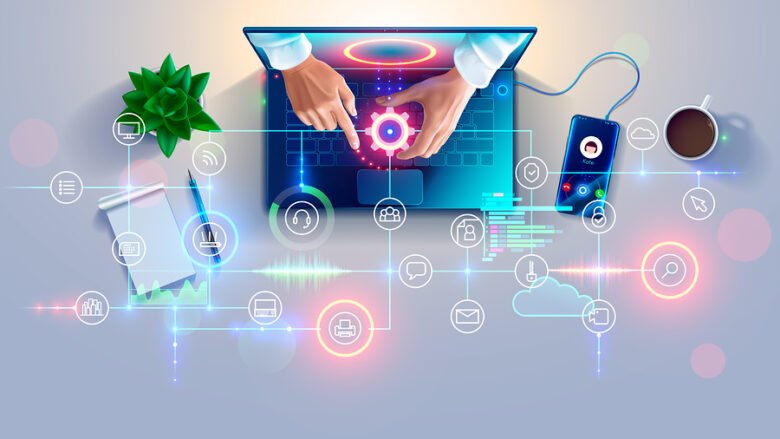With today’s fast-paced world, “digital lifestyle” has become more than just a term; it’s a lifestyle. From the moment we wake up to the moment we go to sleep, technology influences almost every aspect of our daily lives. Smartphones, social networks, online shopping, and other digital services are no longer afterthoughts; they are essential, changing the way we work, communicate, and even relax. A digital lifestyle means using technology in a way that doesn’t disrupt our daily lives. It makes life easier, smarter, and more connected. It changes how we work, learn, interact with others, maintain our health, and even how we entertain ourselves. Understanding the true meaning of a “digital lifestyle” and why it’s so important today is crucial, as people become increasingly reliant on technology.
What Does a Digital Lifestyle Mean?
A digital lifestyle refers to how people use technology to get work done, connect with others, and generally improve their quality of life. Simply having a device or access to the internet isn’t enough; you need to use digital tools and platforms to improve your life. This new digital lifestyle includes working from home, online banking, digital fitness apps, e-learning platforms, and streaming services. It also includes smart homes, wearable technology, and digital health data, making it easier to monitor our health. Digital living is essentially using technology to save time, complete tasks faster, and make life easier. As a result, we are moving away from traditional lifestyles and toward lifestyles that embrace new digital tools. This move will change the way we interact with the world around us.
Why Digital Living Matters:
The importance of digital living is undeniable. It has transformed the way people work, learn, and communicate, making life easier and more comfortable. Businesses that embrace a digital lifestyle can reach customers worldwide, reduce costs, and remain competitive in the digital marketplace. It provides people greater freedom, such as the ability to work from home, learn online, or shop with just a few clicks. Digital living dismantles obstacles like distance, time, and even physical barriers, fostering inclusivity.
It has also significantly impacted consumer behavior and cultural trends, changing everything from how we watch television to how we interact with others. Ultimately, digitalization is crucial today because it meets people’s growing demand for speed, convenience, and efficiency in every aspect of life. Without a digital lifestyle, individuals and businesses risk falling behind in this rapidly changing technological world.
How Digital Living Transforms Daily Life:
Digital living affects every aspect of daily life. Online learning tools, such as e-learning apps and virtual classrooms, allow students to study anywhere in the world. Wearable technology can monitor one’s health, measure their heart rate, and even warn of health risks. There are countless entertainment options, including streaming services, online games, and digital art groups. Digitalization has changed the way we socialize and stay in touch with friends and family.
Video calls, instant messaging, and social networking sites simplify long-distance relationships. Digital accounts, cryptocurrencies, mobile banking, and online banking have made managing money easier. All these examples demonstrate that technology is not an afterthought but an integral part of daily life. One of the most significant changes in modern society is the digital lifestyle, which influences how we think, connect, and experience the world.
The Future of Digital Lifestyles:
With the introduction of new technologies such as artificial intelligence, virtual reality, and the Internet of Things (IoT), trends in digital living will continue to evolve. These new concepts can lead to smarter cities, more personalized healthcare, and more immersive learning and entertainment experiences. The way people work will also continue to change in the future. Advanced communication tools will make remote work and hybrid work models the norm.
However, digital lifestyles raise important questions about privacy, security, and how we can balance online and offline life. However, one certainty remains: the digital lifestyle will only intensify and transform everything, from the operations of countries to our daily lives. In this increasingly digital world, those who adapt and embrace the future will have more choices, richer relationships, and an easier life.
Conclusion:
A digital lifestyle is more than just a trend; it’s a reality today. It defines how we learn, work, communicate, shop, and even relax, integrating technology into every aspect of our lives. While the value of a digital lifestyle lies in the efficiency, ease of access, and global connectivity it offers, it also presents challenges that require careful consideration. This lifestyle provides people and businesses with the tools they need to live and work smarter and more easily, from smart homes to online education and digital healthcare. As technology continues to develop, a digital lifestyle will become increasingly important. It will shape the future of society and change the meaning of modern life. In today’s interconnected world, embracing a digital lifestyle is no longer a choice but a necessity.
FAQs:
1. What does digital living mean?
A digital lifestyle involves integrating technology into daily life, using digital tools and platforms to make things easier, faster, and more efficient.
2. Why is digital living vital today?
It’s important because it increases productivity, connects people around the world, and makes life easier and more flexible in today’s fast-paced digital world.
3. What impact does digital life have on schools?
It enables people to use digital tools, e-learning platforms, and virtual classrooms, making education more flexible and accessible to everyone.
4. Can you provide a few examples of how you use technology in your daily life?
Online shopping, mobile banking, fitness apps, social media, working from home, streaming services, and smart home technology are all examples of these types of applications.
5. What does the future of digital life hold?
The future will involve the use of more advanced technologies, such as artificial intelligence, the Internet of Things, and augmented reality. These technologies will make daily life more connected, efficient, and personalized.


